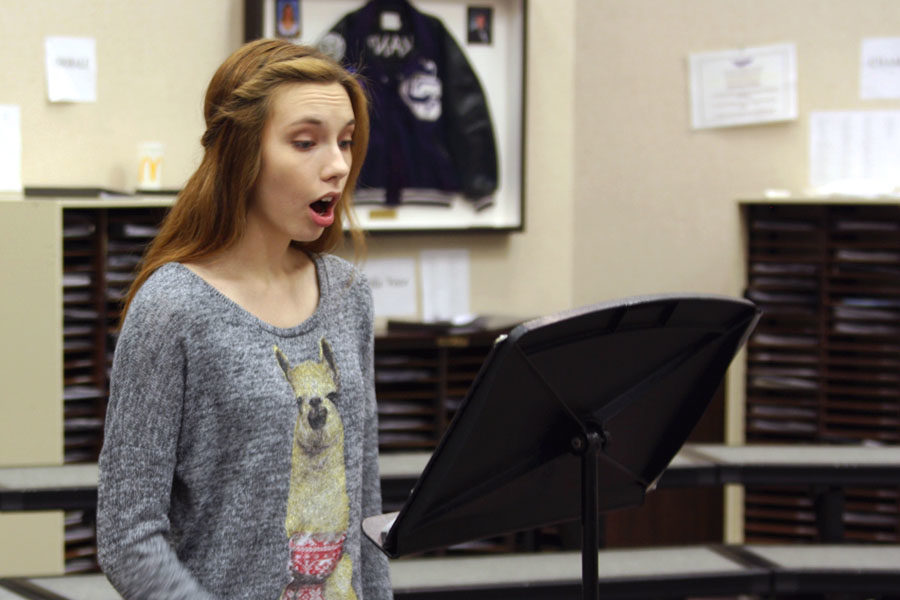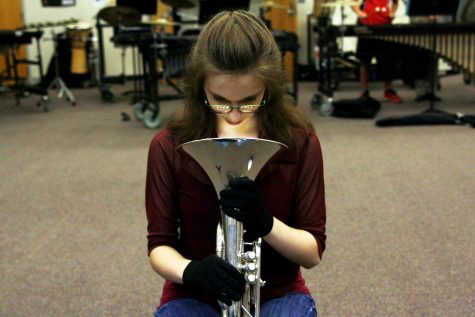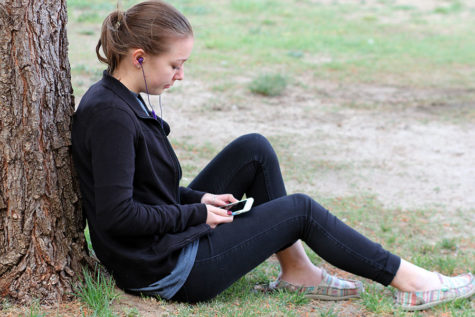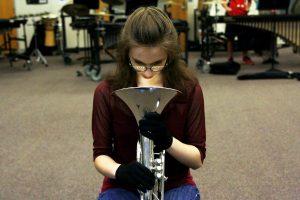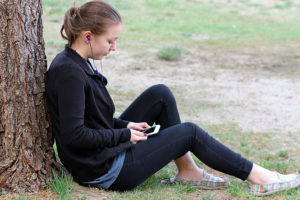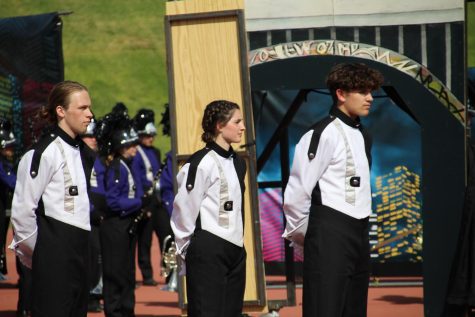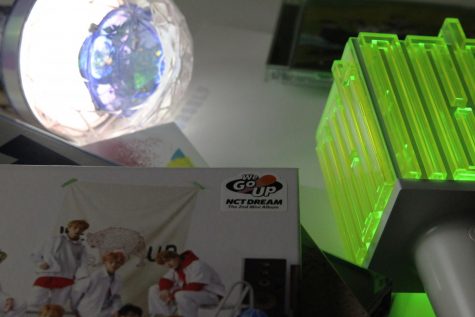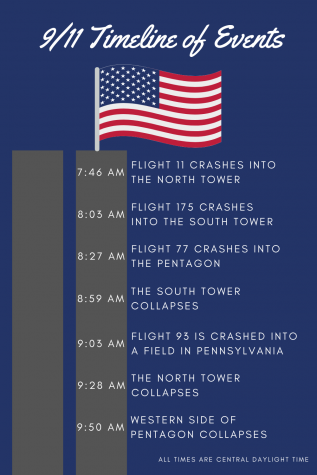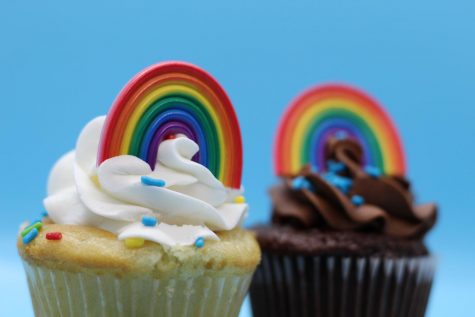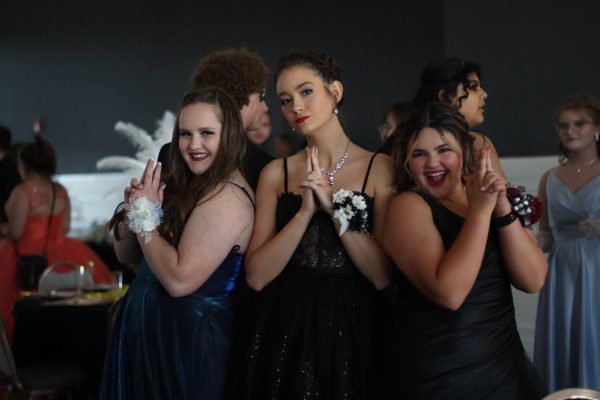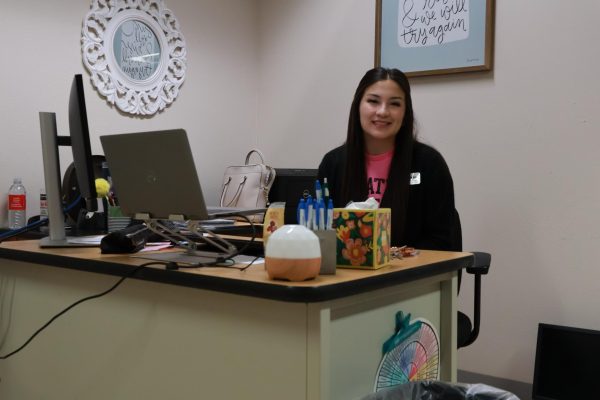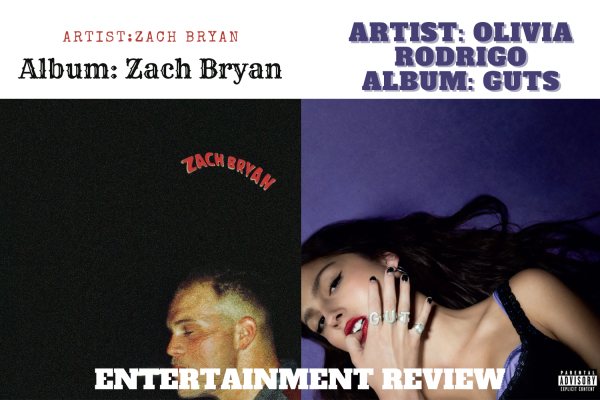The sound of love
Junior Erin Sheffield practices in the choir room.
“…and of course, you love music, so-”
“Well, I don’t know.”
We were standing in the empty choir room. I didn’t mean to reply with “I don’t know.” It’s not the greatest phrase to assert one’s love. Mr. Farren, my choir director, paused.
“What do you mean?”
“I don’t know if I love music. Not yet.”
I really didn’t know. It had not crossed my mind in months. It relieved my stress and motivated me. I knew I liked it to a degree I never had before. I knew I was passionate about it.
Still, love is a strong word. Even if it was just music we discussed, not a person, I knew to throw the term “love” around plainly with my choir director would be a massive insult to his passion.
The conversation shifted away from love after a few moments, but the question remained in my head. “Do I love music?” It kept coming back to me. I had an audition the next weekend, arguably the biggest one of the year, and I wasn’t sure. Was that not wrong? Would it not be cruel to audition if I did not love music and beat someone who did? Would it not be a waste of time to go if I did not care?
I wanted to feel something, anything toward music.
— Erin Sheffield, 11
The question of whether I loved music was by no means new. Because of my music-filled family, I’m constantly exposed to new melodies. I threw frisbees in the band hall at 4 years old, wrote my first song (an absolute 30-second masterpiece titled “Cowboys Camping”) at 5, discovered my perfect pitch at 7 and played my first Chopin waltz at 10. From 3 p.m. to 7 p.m. every weekday, my mother’s piano students serenade me (or don’t–some of them don’t practice and apparently do not realize how bad they sound) in my house’s studio, and, on weekends, my family constantly attends concerts and contests.
On paper, I suppose I was destined to become some musical prodigy. I tried to care about it over and over, but I never truly did. I wanted to feel something, anything toward music. All I noticed was a growing contempt.
At the time I joined choir, I despised music as a whole. Looking back, I can’t remember exactly why I joined choir. It was partly because I had intended to freshman year and ran out of space in my schedule, but it was also because I took a couple voice lessons in eighth grade and enjoyed them.
What I can remember clearly is the nightmare joining choir as a sophomore was. Suddenly, I was in an organization where the teacher would randomly call on you to read a piece of music in a matter of seconds in front of 60 of your silently judging peers (a game affectionately referred to as “Intimidation”).
Given I had the confidence of a peanut and once spent four months working up the courage to sing in front of my best friend, this was slightly problematic.
I had a newfound appreciation for music, one I had striven for since my first piano lesson.
— Erin Sheffield, 11
But what truly ruined choir for me was my freshman year. I had a strangely successful freshman year filled with medals and awards, but this success led me to place nearly all my confidence in contest results. I was not striving for a greater appreciation of music when I practiced for auditions; I was striving for a higher chair at the next audition, a mindset which killed my confidence.
But a year later, although my results were better, I did not rate myself by them anymore. I no longer feared “Intimidation.” Music relieved my stress instead of causing it. I had a newfound appreciation for music, one I had striven for since my first piano lesson.
Liking, however, is not loving. I found myself evaluating my feelings again, concentrating hard on each element of my opinions. Love is a strong word. Did I not like, but love music?
I did not. Not yet, anyway. Perhaps the feelings were there but dull. Perhaps they arrived at just the right time. But I know the exact moment when my love for music was revealed to me.
The biggest audition of the year was the next day. We were all circled around the piano, about 20 choir students running through our pieces.
And this one piece–this half-hour, six movement piece by Francis Poulenc called “Gloria”–had one tiny section. After 25 minutes of all these huge, chaotic movements, hard for singers to read and listeners to understand, the piece ends with just four minutes of raw, uninterrupted beauty.
It’s a slow, gushy, emotion-driven section Mr. Farren always mocked as “the soap opera section.” Every time we hit this one particular set of chords in rehearsal, I had to close my eyes to soak in the beauty, but I’m not sure it ever fully hit me until this one final time.
To me, ‘perfect’ has two meanings.
— Erin Sheffield, 11
Just 20 of us around the piano. We were the survivors, the hard workers who had poured our time and hearts into the music for six months, rehearsing together for the last time after squeezing each others’ hands each time results were announced and supporting each other through the fear of each audition. And during this very last run, we hit that section, and the chord poured out, heartfelt and beautiful, swollen with the emotions of singing it for the final time, and the wonder of it hit me like a sledgehammer.
To me, “perfect” has two meanings. One could say, “Oh my gosh, her makeup is perfect,” which is casual and meaningless.
And then there’s perfect as in, “You are perfect.”
As in, “I know you deeply and can find no fault in you.”
As in, “All the stars align when I am around you.”
I assumed one could only feel that way around a person. But I swear, I felt that second perfect, that “I am in love with you” perfect, that “I would slowly gnaw my own toes off one by one and digest them just to hear you laugh for a couple seconds” perfect, in that one set of raw, emotional chords.
It was that perfect.
I heard a lot about people falling in love with music. I always assumed it was in the way one “loved” an activity like writing: extreme enjoyment.
I never once imagined one could love music in the way one loves a person. Of course people cried when they heard beautiful harmonies. The emotions in that moment were so overwhelmingly powerful, they shook my hands and watered my eyes and wobbled my chin and scrunched my eyebrows into the twitch my brows do right before I lose myself. I managed to keep myself contained for the most part, but a few tears slipped out. It was true, pure love embodied in a single sound.
It was so, so perfect.
And it was mine. I tried over and over to fall in love with music through piano and band and all the other things I joined to please my family. But choir was mine and mine alone. I dedicated myself to this music, because I wanted to. Call it selfish, but I acted out of my own care for music when I sang and invested my own emotions into each note. Only then could I truly savor the wonder of music for what it was.
I did not tell anybody about that moment for a while. But when a few choir members asked me to talk about how I fell in love with music a few weeks later, I spoke to the class about it. Mr. Farren was there. The 20 students from the piano were there. My friends were there. My support, the ones who had driven me through the challenging months of auditions and stress and who I had encouraged right back, were there.
And honestly, truly, I could tell each one of them what I discovered.
I knew I loved music.
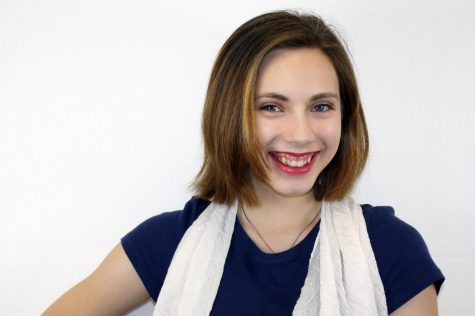
Hullo! I'm a senior in my third year on staff and my second year as an editor-in-chief. You can catch most of my work in the news and blogs sections. When I'm not around the school with a camera and a press pass, I spend my time in choir, musical, various...

